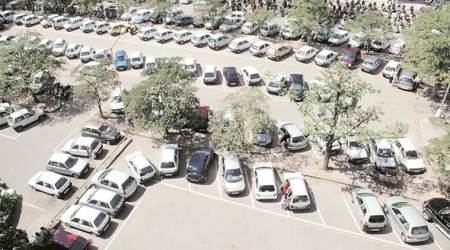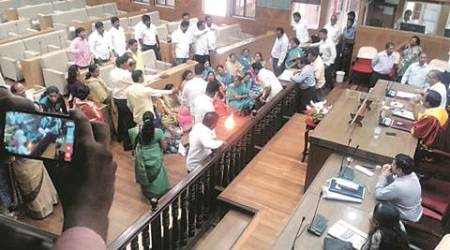 The PMC has been encouraging local residents to segregate waste properly.
The PMC has been encouraging local residents to segregate waste properly.
To encourage residential societies to process wet waste in an eco-friendly manner, the Pune Municipal Corporation (PMC) has been offering them a rebate in property tax if they set up a vermicomposting plant .
Now, to streamline the process and ensure that all societies have a properly functioning plant, the civic body has made it mandatory to register vermicomposting plants. In case they fail to do so, the residential property owners would have to pay Rs 200 as ‘compounding charge’.
In its draft of Public Health and Sanitation By-law 2017, tabled in the Legal Committee, the PMC has steeply increased compounding fees, paid by those who violate by-laws.
Earlier, the PMC could serve notices to violators of by-laws and initiate legal action, but it could only impose a maximum penalty of only Rs 50.
“The PMC was able to fine a maximum of Rs 50 for the violation of by-laws… while the civic body incurred an expenditure of Rs 382 on an average for each such action,” said Suresh Jagtap, joint municipal commissioner and in-charge of the PMC’s solid waste management department.
“…Compounding and administrative charges have been introduced in the by-laws… increasing charges significantly may deter Puneites from committing such violations,” he added.
On why licenses were made mandatory for vermicomposting plants, Jagtap said, “The PMC has observed that the facility for wet processing was set up in the residential properties and tax rebate was availed in return, but the facility became non-functional afterwards. So, those availing a tax rebate by setting up a vermicomposting facility would have to give an assurance in writing… that they would operate it efficiently,” said Jagtap, adding that the license or registration would ensure that the vermicomposting unit was a professional one.
According to the draft, residential premises that don’t have a facility for non-segregation of waste would have to pay compounding charges of Rs 200 the first time and Rs 400 for repeated violations.
Those indulging in open burning or burying of waste would have to pay compounding charges of Rs 200 the first time and Rs 400 for the next violation.
Those found committing acts such as spitting in public, urinating in non-designated places, washing clothes or utensils in non-designated places, littering in order to feed animals or birds in non-designated places, and defecating in non-designated places, would have to pay compounding charges of Rs 500.
The PMC has proposed heavy compounding charges to tackle the issue of plastic waste. The production, distribution, storage, sale or use of plastic or thermocol — in violation of standards laid down under the Plastic Waste Management rules or any other regulations — would attract compounding charges of Rs 5,000 for the first time and Rs 10,000 the second time onwards.
Non-segregation of plastic at source, carrying, using or storing any plastic carry bags below the permissible limits or using plastic items in prohibited locations would attract compounding charges of Rs 200 the first time and Rs 400 thereafter.
Disposal of plastic waste in ways other than mentioned in the by-laws, and using or providing commodities in plastic carry bags, will lead to compounding charges of Rs 200 the first time and Rs 400 the next time onwards.

